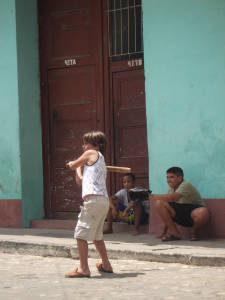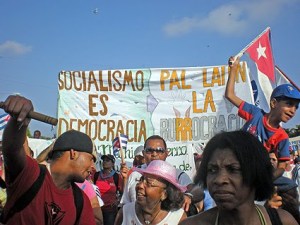latin america
Cuba on Cancun climate talks: `Another year has been lost since the deception of Copenhagen'
Two speeches by Bruno Rodríguez Parrilla, Cuba's minister of foreign affairs, at the COP16 of the UNFCCC, Cancun, Mexico
December 8, 2010 -- Translation by Granma International -- Powerful forces are assuring us without hesitation that climate change does not exist, that there is nothing to be concerned about and that the serious problem bringing us here today is a total fabrication.
They are those in the United States Congress who are currently opposing the ratification of the weak agreements which control the proliferation of nuclear weapons, in a senseless crusade whose sole purpose is to retrieve a small part of the power that they lost barely two years ago.
Cuba: Economic and Social Policy Guidelines for the Party and the Revolution
Translation by Marce Cameron (Australia-Cuba Friendship Society), corrections by Paul Greene.
Cuba: Reforms bode shaky future

Photo by Steve Morgan/Havana Times.
Links International Journal of Socialist Renewal is posting Ron Ridenour's critical analysis of the proposed economic changes in Cuba, with Ridenour's permission, to reflect as many perspectives of friends of the Cuban Revolution as possible, and to inform the discussion among them. For more analysis, click HERE.
* * *
By Ron Ridenour
November 30, 2010 — Havana Times — With the November 2010 publication of 291 proposals for reforms in 12 areas of economic and social life Cubans are once again faced with a national debate on policies. A key question is if the 800,000 Communist Party (PCC) members’ discussion, plus that of non-members, will affect the policies to be taken at the forthcoming PCC VI congress, in April 2011. There is no proposed mechanism to assure such in the 32-page document.
The state, social movements and revolution in Latin America

By Federico Fuentes
November 28, 2010 -- Green Left Weekly -- It should come as no surprise that Latin America, a region converted into a laboratory for ongoing experiments in social change, has increasingly become the topic of discussion and debate among the broader left.
Latin America has not only dealt blows to imperialism but also raised the banner of socialism on a global scale. It is of strategic importance for those fighting for a better world, especially at a time when capitalism is in systemic crisis.
Latin America’s landscape of powerful social movements, left governments of various shades, revolutionary insurrections, and growing expressions of indigenous resistance and worker control, provides a perfect scenario for leftists to learn about, and debate, revolutionary strategy and tactics.
This should not simply be an academic debate. It should look at how to best build solidarity with these movements for change and gain insight for struggles at home.
Of late, burning dispute has opened up, mostly among those writing from an anti-capitalist orientation: a debate over the complex relationship, or “dance” as Ben Dangl calls it, between social movements and states in Latin America.
`Foro Social Latinamericano', Green Left Weekly's Spanish-language supplement, November 2010 issue
The tide of rebellion and revolution now sweeping Latin America is posing a serious challenge to imperialism’s brutal global rule. For anyone who wants an end to war, exploitation and oppression, Latin America’s struggles to create alternatives are crucially important.
Australia's leading socialist newspaper Green Left Weekly is strongly committed to supporting the growing “people’s power” movement in Latin America. We are proud of the fact that GLW is the only Australian newspaper to have a permanent bureau in Latin America, based in Caracas, Venezuela. Through our weekly articles on developments in the region, GLW strives to counter the corporate media’s many lies about Latin America’s revolutions, and to give a voice in English to the people’s movements for change.
Cubans discuss economic changes: `It is the people who will decide'

[For more analysis and discussion on the economic changes in Cuba, click HERE.]
November 19, 2010 -- Granma -- The 6th congress of the Communist Party of Cuba will take place in April 2011 and the only topic of discussion will be the analysis of the country's economic and social model. Prior to the congress, from December 2010 through February 2011, a process of popular debate will unfold based on a fundamental party document entitled "The Economic and Social Policy Development Project", which is already in the hands of the people, a sampling of whose opinions Granma offers.
`This is genuine socialist democracy'
Haiti: Sham `selection' serves interests of wealthy elite and foreign powers
By the Canada Haiti Action Network
November 12, 2010 -- The Canada Haiti Action Network (CHAN) is once again expressing its grave concerns about exclusionary elections in Haiti.[1] It joins with the many Haitians as well as human rights organisations in Haiti and abroad in condemning these elections as serving the interests of Haiti's wealthy elite and the foreign powers that have dominated Haiti's past and present.
Join the May Day 2011 solidarity brigade to Venezuela! April 25–May 4, 2011

Photo taken by AVSN brigadista Raul Burbano during the September 2010 solidarity brigade to Venezuela.
Join the May Day 2011 solidarity brigade to Venezuela! April 25–May 4, 2011
The Australia-Venezuela Solidarity Network invites you to observe first-hand the inspiring Bolivarian revolution in Venezuela. The sweeping social changes being carried out by Venezuela’s “people’s power” movements are radically transforming life for the majority in that country - workers, women, Indigenous people, young people and all those who have suffered the injustices of poverty, exploitation and exclusion that accompany corporate globalisation.
Along the way, this remarkable revolution is showing the rest of the world that a more rational, socially just and sustainable future is possible.
Cuba: Reversing the medical `brain drain’ – the many faces of ELAM

ELAM students.
By Don Fitz, Havana
Cuban Communist Oscar Martinez: `Our economic reforms are based on socialist principles'

"We are reorganising the workforce, not firing workers. We are directing them to other areas of work vital for the economy, mainly food production."
[For more analysis and discussion on the economic changes in Cuba, click HERE.]
November 3, 2010 -- Umsebenzi -- A South African Communist Party (SACP) delegation recently visited Cuba a part of its political interaction between South Africa and Cuba, and its quest to build socialism and strengthen ties between it and the Communist Party of Cuba.
Yunus Carrim, editor of the SACP's monthly journal, Umsebenzi, interviewed Oscar Martinez, the deputy head of the International Relations Department of the Communist Party of Cuba. Published below is the full interview, as it appeared in Umsebenzi.
* * *
Yunus Carrim: What is the nature of the economic problems Cuba is currently experiencing?